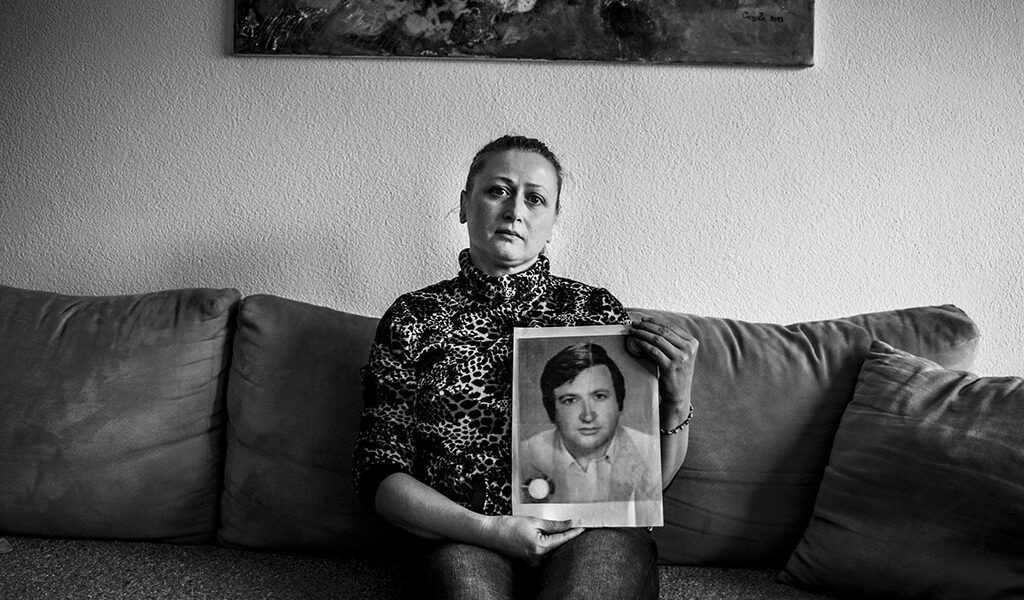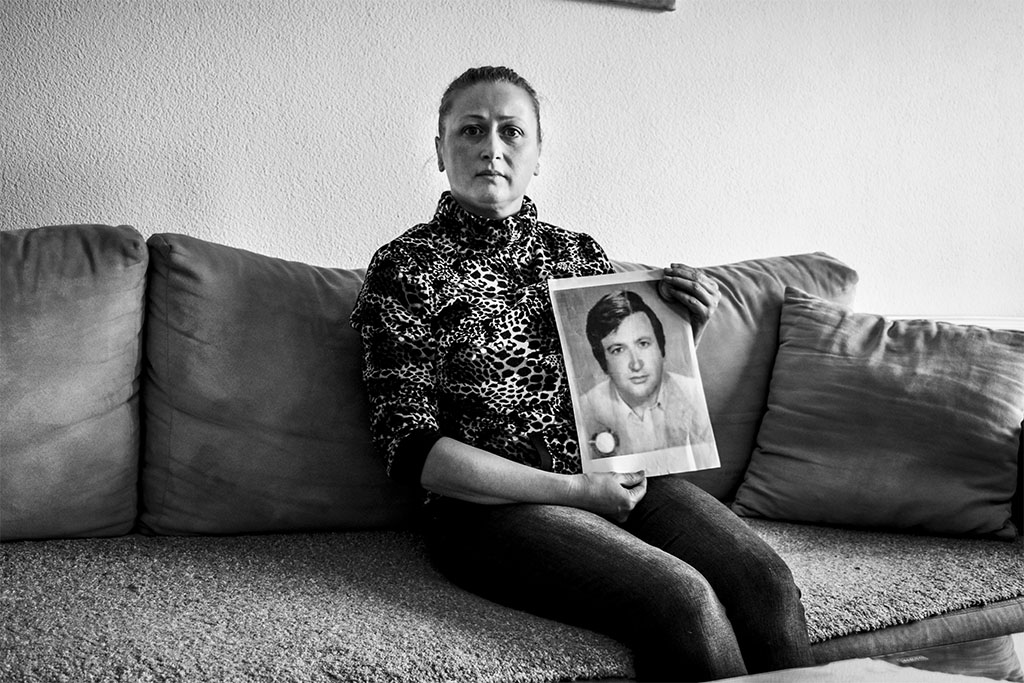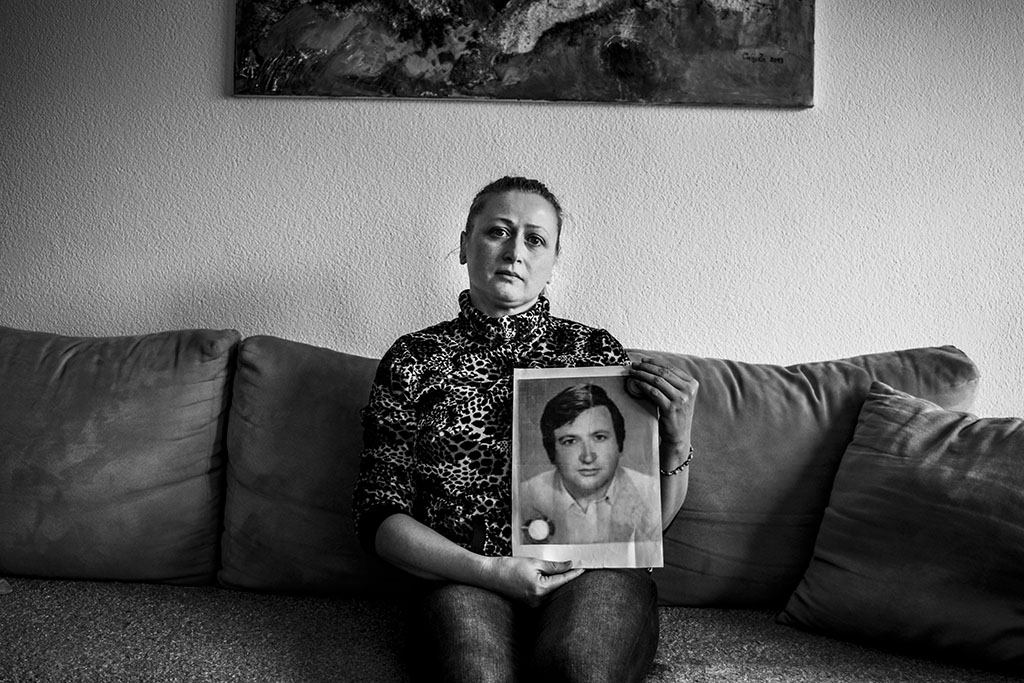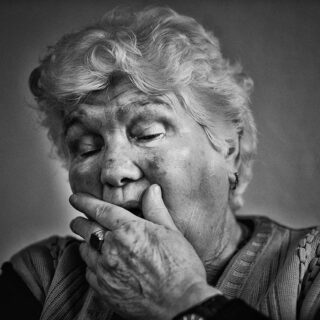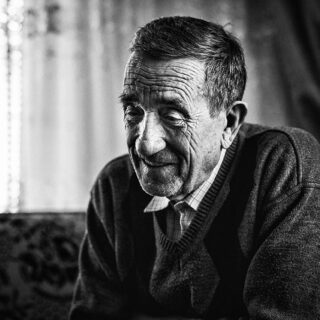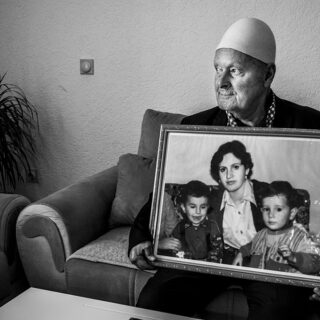INTERVIEW WITH: JASMINA ŽIVKOVIĆ
Paun Zivkovic in June 1999 withdraws his family from Ferizaj to the Štrpce area where Serbs feel safer by being more homogenous. The family bids farewell to life and work in the city, leaving the house with all the possessions behind.
With the organization of the new school year that September in the new settlement, files and all the documentation from the schools that many of the Serbs had went to in Ferizaj until few months ago, had to be filed in the new school. Six of the principals and teachers ask the Polish KFOR to provide escort to get documentation from the schools they had abandoned in Ferizaj. Among them, is Paun Zivkovic, technical high school principal, one of the two directors who went to Ferizaj that day but never came back.
His daughter, Jasmina, says that his family members, although aware that for twenty years they are unaware of his whereabouts, and despite the fact that in EULEX and UNMIK they claim that none of the kidnapped Serbs have survived alive, can still not imagine their father dead, bringing life to a strange kind of feeling, which always stays present, but can hardly be described.
Jasmina Zivkovic: Narration in first person
My name is Jasmina Zivkovic, born on October 26, 1977 in Pristina, but I lived in Ferizaj with my family. I am the oldest sister; I have two younger sisters. My father was called Paun Zivkovic, while my mother is called Bozidarka Zivkovic. We lived in Ferizaj where I finished primary and secondary school, mathematics branch. In 1996, I enrolled in the law faculty in Pristina and until 1999 I finished all my exams in the due time. I was finishing the faculty and in Pristina I spent three years as a student, but when bombing started I had to stop studying. Until April 1999, we were in Ferizaj, but when the bombing and all the war events started, we were no longer safe in Ferizaj and we came to the village of Gotovusa in Štrpce, since my parents are from here, i.e. from Zhupa.
At that time, since a majority of the Serb population lives here, my father thought that we would be safer in Ferizaj in any case. We left our home in Ferizaj with all the things in it. Ever since we left the city we could not go back, and all the memories of life were left there. To tell you the truth, no one of us had the willingness to return to Ferizaj and I myself avoid Ferizaj because it reminds me of some good but also some bitter moments, since after a while my dad was kidnapped in that city and then disappeared. Since then I know nothing about him.
This happened on 28 September 1999. The father was the director of the technical secondary school in Ferizaj. Bombings ended and unfortunately all Serbs had to leave the town on June 15, 1999, because they were threatened, attacked, and killed. Simply, the city had to be cleansed of all the Serbs. All the IDPs called my father to ask him about the documents of students and professors working in the technical school in order to enroll and continue their education and work in the places they were displaced.
KFOR had already entered Kosovo. Here in the Strpce municipality were based KFOR from Ukraine and Poland under the command of American KFOR in Bondsteel. Then my dad, together with some colleagues who were directors of elementary schools in Ferizaj, as well as the director of the economic school in Ferizaj, went to KFOR to ask them to accompany them to the city schools to obtain student documents and teachers files so that they could continue life in the places where they had fled. For a long time, they did not want to accompany them. One morning, on September 28, around 7:30 – 8:00 pm – I know that I and my sisters were still asleep – we heard from the window that a man came and told his father: “Paun, now they want to accompany us and we are going to Ferizaj for documents “.
The one who came was a father’s friend, was called Milan. That day they went to Ferizaj, accompanied by Polish KFOR: two vehicles and their accompanying soldiers, and we never managed to learn the names of the soldiers in those vehicles. Of course, American KFOR had given permission for two Polish KFOR vehicles with Serb civilians to go to Ferizaj, because that’s how the command works, everyone knows that. Together with my father there were also five other Serb people: Milan Nikolevic, Snezana Zivkovic, who came from Serbia as high school economics director, Marko Stojanovic, aunt Olga’s husband, director of the first elementary school … Now I cannot remember the other names, but it seems to me there were two women, Brankica and Zorica. I think these were the six people in two vehicles. They went around 8:00 or 8:30 in the morning to Ferizaj. We were at home with our mother and we did not suspect anything because they went with KFOR to get documents. Then there were no mobile phones to communicate with and we did not suspect something bad happened until it became dark and our father did not return home.
That night both cars came. The time was probably around 7:30 or 8:00. They said Paun and Marko were missing. Initially we and our mother did not know what they were saying to us because they had gone under their companionship. I was 19, the other sister was 17 and the youngest was 10 years old. So, we did not understand what they meant when they said they “are not” with them. They told us this in just ten minutes, returned the vehicles and went to their base in Brezovica. Later we went to them, but none of them wanted to talk to us or show us the names of the drivers that escorted the six Serbs to Ferizaj, nothing at all.
Then Milan Nikolevic, who was with my father and uncle Marko in the car, told us about the whole event. He told us that they were the first to go to the technical school where father worked, received some documents they found, then went to the economic school and there they received the documents they found, then they went to the first primary school that is in the market direction.
They arrived there around 12:30 – 01: 00. The school was filled with students and teachers, and they entered the office where Agim Rexhepi, Halim Salihu and Fadil Sejdiu were sitting, I think that the director, the cashier and the school secretary were their positions. Father and uncle Marko entered, greeted them because they knew them as colleagues from before, asked for the documents and they told them they would give anything they could find. But then, Svetlana, who was with them, wanted to visit the family cemetery in Doganovic, and they said that father and Marko could be in the office until former Albanian colleagues brought their documents, while both KFOR vehicles left them there and went to visit the cemetery of Svetlana’s family.
Later, people who were in the office said that some people came, in black uniforms, and wondered why dad and Marko were there. They took them out and those in the office say they know nothing more. Then we do not know anything for sure; we only heard rumors. KFOR claims to have controlled the school and the city, but it seems no one has seen anything. How is it that, in the middle of the day, when the school was filled with students and teachers, so on a business day, no one saw anything, and two people simply disappeared?
When KFOR jeeps returned, the three people in the office, Agim, Halim and Fadil, first said that they had gone to drink tea, and then that some of their friends came and they went out for coffee, so these are the versions that they have told us. We were not there, but they told us that. KFOR added that the two Polish KFOR vehicles allegedly had looked for them, they tried to find them, but I suspect they did not even look for them because it is impossible, since they did not even stay there. You cannot put two people in your pocket and take them somewhere and that no one sees anything; they could not leave so far, and no one knew anything.
We talked to Svetlana too, but she just did not say anything to us. They came back that day and she immediately went to Serbia. She then returned here and said they were no longer in the jeep with her, so she knew nothing concrete.
When our father disappeared, we immediately went to Breza, because there was a Polish KFOR settled there and we wanted to ask them questions in order to learn something more, but no one wanted to talk to us. The next day we went to UNMIK police and told them all we heard and knew. Most of them assured us they would find them; they would do their best, and so on.
Later, we organized barricades on the Trakovac-Gotovusa road, blocked them with friends and family so that the vehicles could not go through, in the hope that we would urge someone to do something, since at that time we did not have electricity for three months, because they had destroyed the transmitter poles, and we had no telephones, no connections to the outside world, and we were not sure if we left out Trajkovc in Zupa. We were like in a ghetto and we are still in a kind of a ghetto, because no one can come to you and you cannot go to anyone. None of us dares to go to Ferizaj because the same thing could happen to us as well.
Then, American KFOR joined the so-called search. At that time there was Colonel Michael Elerby, who came to our home very often convincing us that he was close to finding our father and uncle Marko, that they were in Viti, that they were in a building in Ferizaj, that they were very close and this continued for six months that he was here and then his term here was finished, he went to his home leaving us with nothing. Sometimes, someone from UNMIK police came to us to ask us what our father was wearing, they were looking for pictures, and this is the only picture left to me, which is a copy of the ones we gave to them. This is a photo from an ID card. All our other photos are left in Ferizaj, but there were only a few who were left by chance, all the others we gave and we no longer had other photos to give to them.
We have also tried to talk to some Albanians who have known my grandfather, some of the elderly, to help us, offered our home in Ferizaj for any information that someone might have, we talked to everyone. Then we went to Pristina to the German commander of all KFOR, Reinhardt, but he had attended us for very shortly and after this conversation Colonel Michael Elerby left the case. Then Couchner came to Strpce, and we tried to contact him but we barely managed to give him a letter so that he would help us as a responsible person for UNMIK; however we only got words, sometimes that they were in Albania, or in ‘Zhitopromet’ in Ferizaj, or that they were in Viti, but nothing concrete.
To tell you the truth, I still have a feeling that he is alive, since we have not received any other information yet. But this is a subjective feeling and it is very difficult to accept the opposite even when you know that 20 years have passed. My father was born on November 26, 1947, which means that today after 20 years, if he had been at home, he probably would not be alive, but none of us says that. When I speak to my mother and sisters, no one can say that he is not alive.
Even during 2004, when that persecution took place, the most difficult thing was when we thought we were leaving Kosovo when we did not know what had happened to the father. How could we get away when he was somewhere else; maybe a miracle would happen, although most in EULEX and UNMIK say that none of the kidnapped Serbs was alive and that the chances are minimal, since there was no case when any Serb were found alive. Whoever is taken is dead and either found or not found, but even when they tell us, we just do not accept it completely because there is nothing tangible. A month before this, on July 21, my father’s brother disappeared on the Štrpce-Ferizaj road. Along with two others from Gotovusa they went missing out of the car on July 21, and we know anything about them two too. So what befall us is that our uncle disappeared on July 21, and father had taken the courage to go to Ferizaj for documents, thinking he did not have to fear whether something could happen to him.
We Serbs have this habit of burning candles for the living and for the dead. No one ever in my family has lit a candle for my father, and I do not even know what it is, just do not know how to describe it. Very often we go to the church and no one has the power to light a candle, which is not for the living and every holiday it is very difficult. I have two children, my second sister also has two, the younger sister has a son, and all this reminds us of him and it is very difficult.
I remember my dad as a very honest man this day. He was extremely honest, zealous and honored, by both Serbs and Albanians. If you know any one of his peers from Ferizaj, especially from the field of education, you can freely ask them, and I am certain you would get the same response from them too. You would get the same from our former neighbors in Ferizaj too. He helped anyone who could have needed help and never boasted nor talked about it, but only when someone met and thanked him, would we know how many people he helped.
I remember many moments with him. These memories are very vivid even though 20 years have passed. I remember when I went to school, his help about homework, because my dad finished his biology branch in Pristina and knew well about biology and physics, and whenever we got stuck with the lessons, he helped us. Then it was time I went to college and my dad came to visit me in student dormitories. When I sometimes stay alone at home, I feel like I can hear his voice. Or, when I’m on the road, I often stop and go back, and then I realize it’s impossible. Or sometimes in the crowd, when someone resembles me, I follow in hope it might be him.
In my dream I do not leave, I do not know why. But simply, time stops, and 20 years are like two days. All us three sisters are married, and none of us had a wedding party, because of him we did not wear our bride’s clothes. Simply, you cannot honor your guests and be happy. I can freely say that for ten years no one speaks more specifically about my father, nor about uncle Marko, because normally we expect from EULEX, UNMIK, KFOR, we know we can not to do something ourselves and when EULEX and KFOR say they have no data, it sounds frivolous and a lack of respect for families. And it is impossible, because in the 21st century, with all that technology and all the accessories available to the world, they tell us that they have no data. It is impossible. I, my family and most families of the missing are convinced that those institutions are knowledgeable, but unfortunately I think that politics is involved here and these cases are still unsettled because they are not ready to show responsibility and to present the facts in front of the world. First in front of families and then in front of the world.
My mother was a teacher, for fifteen years she worked in Kaçanik, the oldest in Gërlicë, but within the school of Ferizaj. Mother has simply collapsed, in every sense, physically and mentally. I and my second sister wanted to protect our mother and our little sister, and we went to the barricades, the police, KFOR and we went out on the street, we stopped KFOR to ask for everything. My sister and I we went anywhere to get more information. We have come to the conclusion that everything is known, and nothing happened accidentally.
In Ferizaj, immediately after the withdrawal of the Serbian army and police and the entrance of KFOR, the KLA fighters entered too. It is well known that everyone has had their area of responsibility in Kosovo. Those people who have been in the office with our father and uncle Marko say that there were people wearing black uniforms, it is known that black uniforms were worn by KLA soldiers, and who was responsible for the Ferizaj area by the KLA needs to have knowledge. I do not know any names and at that time I was a kid, but someone has to know it. I know that Ferizaj was the area of responsibility of American KFOR. In my opinion, the Americans know everything there is, coming here and being equipped with all that technology available to them not only for their area of responsibility, but also for the whole of Kosovo.
The two governments, Pristina and Belgrade, should not include politics here. Unfortunately, I live here in Kosovo and I have noticed that this situation is being used more for political purposes than it is for someone who is concerned for the missing, and it is always stressed that someone works for it, however nobody does anything concrete. This applies to all, not just for my father, but for all missing persons. Simply, politics is very involved here and where politics is introduced, we will remain in the same place.
Bearing in mind that the dialogue in Brussels is confined and no agreement reached there is respected, I doubt that this will be resolved in Brussels. International, military and civilian organizations are found throughout Kosovo and have pushed pressure on those responsible to do something from the outset. We have to put more pressure on them, because with the discovery of the truth about missing persons, the names of responsible people come to the fore. Respondents should be punished for what they have done.
Now, how many are willing to accept what has happened I do not know, I sincerely suspect that there is still willingness, but I still hope. I am sure that KFOR has data because they entered in June 1999 and this happened in September. At that time there was UNMIK and for me it is simply unbelievable, because if there is no data, then those for me are not organizations. But my suspicion is that none of the international organizations have that influence, perhaps the most influential person in Kosovo and beyond, are the Americans, and that was the area of responsibility for American KFOR. Ferizaj, Strpce and Gjilan are still, I do not think that this has changed.
It’s very difficult when you have such a family, it’s a big burden, and you cannot do anything. This applies to all, Serbs, Albanians and Roma. To all. It has been 20 years and it is very difficult to use it for political purposes, to gain political points and often for material benefits from various organizations. And indeed, nobody cares about this job. Perhaps this is in the nature of man, I do not know, but no one can understand except the other families whose people have disappeared. The most important thing is not to blame each other, since not all Serbs are guilty of something that happened to anyone and not all Albanians are guilty of what happened to my father but the ones w who are guilty should be known by name and surname. I know it is difficult to open to one another, but we must try to find the truth together.
Again I say – I am aware that this circle has closed, there is simply no information, because those people could not have disappeared, but there is simply no information where they were sent, whether they were held naked or killed immediately, if so, where were they killed. They have to be here because Kosovo is not large, but people are still closed. When they are ready to open, I do not know. I’m afraid they will probably never be opened, but then it will be even harder. I do not believe in fairy tales and I do not believe things can change overnight. I know it’s not easy, but my dad and uncle Marko vanished in the center of the town in the middle of the day. The students, the teachers, and the three of them who were with them, were unable to see anything? This simply is impossible.
We as a family are all here in Strpce. All of us three sisters are married. Mother lives with her little sister. We all manage. I am a deputy in the Kosovo Assembly; my second sister does not work; only her husband does, while the little sister works in a private company where she translates from English into Serbian. We are alive and we do not complain about this aspect, but the memory of the father in every New Year, every holiday, every birthday … we do not mention him, especially for these festivities we do not mention him because we do not want to cry or become burdensome to others. That burden is carried within ourselves and I never want anyone to put up with what I think about it all the time, because only the one who is tried is taught to live with it and does not forget or pass it, but learns to live without loaded with anyone.
I repeat that families are forgotten by the institutions and tell you the truth when you sent me the interview request to surprise me because nobody wants to talk about it except when there is any political or material benefit. Simply this is so, and when families meet, as I have heard, both in Serbs and Albanians, all have the same story and this is a fact that I do not know if we can change it. Maybe we can try but I do not think we can change it.
Here in Štrpce there are 13 families with missing people, and we are all know each other, we have the same stories, but when I hear stories of families from other parts of Kosovo it seems like talking to only one family whether Serbian or Albanian. When I hear the stories of others, they all are summarized in the same way, I have the impression that this seems to have been planned, as if all of us were served the same story. I have to repeat that we could not go anywhere. Only a small number of people wanted to come to us, because at that time you could not venture out of the enclave, as soon as you would, you would disappear or be killed. And after 20 years, you think or have meant that everyone tells us the same story and finally the story of each family is the same. It’s been 20 years, this is a very long time, and now that you have come, this gives me a hope that something will move, and someone will react. I am convinced that the larger organizations know, but are they willing to stand before us and the world? I always have a ray of hope, after you came and after what you are going to prepare, I believe someone will be ready to come out to tell the truth.
When someone after 10-15 years comes to you and asks you: “Do you remember the clothes, the coat your father was wearing that day, how did it look?” After all that time, you expect him to say something to you, not to give him the information. I think this is offensive, I do not know how to describe it, it’s a kind of humiliation and makes you feel empty when someone comes from where you are expecting answers but he asks you, “What was he wearing that day, what did he look like and do you have any pictures,” and since you have provided many times this data and expect someone to resolve the issue. Someone is playing with us. Believe me, the last time EULEX called a family in Gracanica 6 or 7 years ago and told us that it is important and urgent, and we go in the hope that they will probably tell us something when they ask “Do you not have any pictures?”, “What was he wearing,” then a “thank you” and a “good day”.
Now is the time for those who know how to come up with the truth, because families can no longer wait. Now there is a law in the Assembly and of course it has to be worked with, because families feel lost neglected and there are many issues that need to be solved, but we cannot solve them because it is not foreseen by law. I think we’re still running. We do not have all that is needed to help the family members. It is said that everyone is willing to provide help, but little is applied in real life. We need concrete actions.
(This story is part of “Living with memories of the missing: Memory book with stories of family members of the missing from the last war in Kosovo”, implemented by forumZFD program in Kosovo and Integra, in cooperation with Missing Persons Resource Centre, with the support of Federal Ministry for Economic Cooperation and Development (BMZ), Rockefeller Brothers and Swiss Embassy in Kosovo)
